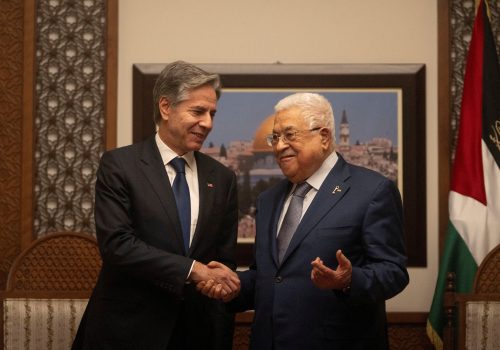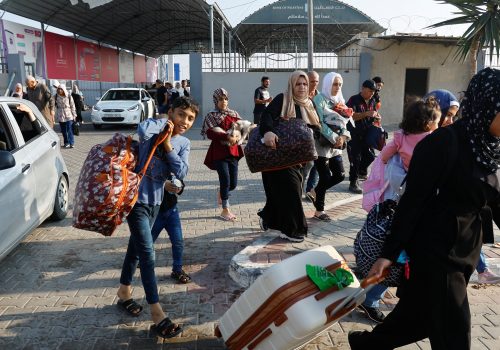China is fixed on discrediting the US on Gaza War. But this policy lacks credibility and will likely fail.
China has been charting a cautious policy on Israel’s war in the Gaza Strip since the Hamas attack on October 7. China’s focus on discrediting and undermining the United States’ political and moral standing, while signalling neutrality publicly,can be called anti-Western neutrality in the context of the current war.
As a result, Beijing is adopting a discursive posturing policy involved in international diplomatic efforts while avoiding high risks. This partly explains its fixation on keeping its intervention vague and generalist. On November 30, the last day of its United Nations Security Council rotating presidency, China published a five-point position paper—similar to its twelve-point position paper on the Ukraine war that didn’t go far—on the Israeli-Palestinian conflict, which included calling for a ceasefire and humanitarian aid for the Palestinians, as well as mediation and political settlement towards a two-state solution. This has been China’s consistent message since October 7.
Stay updated
This Week in the Mideast Newsletter delivers the best Atlantic Council expert insights and analysis on the Middle East and North Africa directly to your inbox. Subscribe now.
At the same time, Beijing upped its aggressive rhetoric against Israel without mentioning Hamas’s heinous attacks against Israeli civilians. On October 15, Chinese Foreign Minister Wang Yi criticized Israel’s bombardment of civilians, saying: “Israel’s actions have gone beyond self-defense,” and described Israel’s campaign as “collective punishment.” By alienating Israel, Beijing is sending a clear message that the country ranks low on its strategic priorities. It is happy to treat it as collateral damage to gain both Arab and Muslim countries’ recognition as the legitimate leader of the Global South.
On November 20, Wang Yi welcomed the Arab and Islamic ministerial committee on the war in Gaza in Beijing—their first stop as part of a diplomatic push to end the war. Wang said that “China is a good friend and brother of Arab and Islamic countries… We have always firmly safeguarded the legitimate rights and interests of Arab [and] Islamic countries and have always firmly supported the just cause of the Palestinian people.”
China has a clear objective. It wants to align its position with the Arab and Muslim countries on the war. In return, it expects to receive their support in international organizations on strategic issues such as Taiwan, Xinjiang province, and China’s global governance model.
But Beijing’s policy will most likely backfire. China neither has the trust of Israel nor the Palestinians. China’s position is at odds with the influential Arab states and lacks credibility and leverage to rein in Iran and its proxies in the region.
Israel, the more powerful party to the conflict, no longer sees China as a credible mediator. Israel was “deeply disappointed” by Beijing’s reaction to the October 7 attack. Although Israel’s disappointment is slightly bewildering given China’s consistent pro-Palestinian position since Mao Zedong, the latter’s policy on Gaza will leave a psychological dent in the Israeli political and military establishment and public consciousness.
The Palestinians—the other party to the conflict—don’t trust China to play any meaningful role in the conflict. During Palestinian President Mahmoud Abbas’s visit to Beijing in June, China elevated its relationship with the Palestinian Authority (PA) to “strategic partnership”—the second highest rank in China’s diplomatic interactions. Chinese President Xi Jinping offered a three-point proposal meant to achieve “a just and lasting solution to the Palestine issue.”
However, China’s seriousness on mediation proved to be smoke and mirrors. Since the beginning of the war, Beijing has offered a meager $4 million in humanitarian assistance to the Palestinians. The opaqueness of China’s diplomatic language and the insignificant sum of money provided by the world’s second-largest economy are on par with the level of trust Palestinians have in China’s sincerity to play a role. Both Israeli’s and Palestinian’s negative perceptions render Beijing’s mediating prospects mere chimeras.
Furthermore, China seems out of its depth on the Palestinian issue. While China’s pro-Palestinian position aligns with the majority of Middle Eastern governments, its policy of refusing to call Hamas out for killing civilians inadvertently contradicts its Arab government partners. This is because Beijing’s adamant silence on Hamas elevates the group to the level of the PA as a legitimate representative of the Palestinian cause.
This contradictory position is not a matter of Arab governments saying different things about Hamas in private in contrast to their public statements. Arab states condemned Israel’s targeting of civilians and “flagrant violations of international law” in Gaza. Simultaneously, some Gulf countries—like the United Arab Emirates (UAE) and Bahrain, which have signed the Abraham Accords with Israel—condemned Hamas, too. On December 7, Egyptian Foreign Minister Sameh Shoukry said that “the PA and the Palestinian Liberation Organization (PLO) are the legitimate representatives of the Palestinian people” and should be empowered to govern Gaza after the war. By treating Hamas as an embodiment of the Palestinians and the cause, Beijing is missing the nuances of the conflict. It reflects, among other things, the deficit of experience among its diplomatic cadres on this complicated issue.
Despite China deliberately avoiding taking part in the conflict, it has been considered a potential regional stabilizer. US Secretary of State Antony Blinken thought to enlist China’s support in containing the conflict and to prevent it from expanding beyond Gaza. Blinken repeated the same call on December 6. Beijing clearly has a stake in stopping the war from becoming a regional conflict. Approximately one million Chinese citizens live and work in the Middle East. More importantly, China sees oil flow from the Gulf to its shores via the Hormuz Strait and other maritime checkpoints as a vital strategic interest. Additionally, China has billions of dollars of Belt and Road investments in the region, and its overall trade with the Arab world reached more than $430 billion in 2022. China relies on regional stability, which the US-led security architecture guarantees, to protect and expand its interests.
However, since China’s mediation in the diplomatic deal between Saudi Arabia and Iran in March, expectations that Beijing has enough leverage to pressure these countries to do anything have been overblown. China can do little to convince Iran to rein in Lebanese Hezbollah from attacking Israel in the north nor stop Iraqi Shia militias from harassingAmerican troops and diplomats. Even if it could, the Chinese would not go out of their way and endanger their relations with strategic partners to give Washington a free win. This explains why China’s Middle East envoy, Zhai Jun, has deliberately kept a low profile since his sole visit to the region in October.
The culmination of all the challenges above creates an unmitigated dilemma for Beijing. On the one hand, if China chooses to change its future policies and play a central role in the conflict, there is no evidence it will be willing to spend much political capital on presenting alternative solutions to the US view of the two-state solution or the Arab Peace Initiative. China doesn’t have a vision for a political settlement and is unlikely to offer one soon. This intensifies the credibility deficit that has dominated China’s position since the conflict began, which is expected to increase as long as no one in Israel and the Gaza Strip, the West Bank, or the wider region takes China’s proposals seriously. Although China is interested in exerting pressure on the US’s stance, it has no desire to directly challenge its historical role as the sole interlocutor in the conflict. If China wants to have a bigger role, this will inevitably change. Pushing forward alternative visions and locking horns with the US is a high-risk endeavor that will continue to prevent Beijing from contemplating serious intervention.
On the other hand, China’s rhetorical posturing, without action, reveals Beijing’s weaknesses. This includes China’s high sense of risk aversion and transactionalism and its policy being driven, first and foremost, by self-interest.
This makes the Gaza war the moment of truth for China’s influence in the Middle East. If mediation between Saudi Arabia and Iran raised expectations about a more Chinese role in the region, the Gaza war effectively dumped them.
The US should double down on these weaknesses in its deliberations with the Arab states. Although it has always been understood in Arab capitals that Beijing has no desire to turn into a major security player, exposing China’s desire to use the Palestinian cause as a pawn in its competition with the US is important. It leaves no room for illusions in the region about China’s intentions and strategic objectives, which seem blurred and fuzzy in many Middle Eastern quarters.
In addition, while the policy of cooperating with China on regional stability and security is a correct one, Washington should not expect significant results to emerge from this interaction. Instead, it should continue to focus on deterrence to fend off attacks against US troops and diplomatic missions by Iran-backed proxies. Simultaneously, it should rely on its European partners, who still have open communication channels with the Iranians, to send a message that explains the cost of escalation and offers them important incentives.
Most importantly, the US should do everything possible to achieve a permanent ceasefire immediately. It should be clearly understood that, as long as Israel continues to kill Palestinian civilians in Gaza, China will use the eroding effect this has on the US’s credibility and double-standards that currently dominates the majority’s perceptions of the US in the Middle East to achieve its own ambitions.
Ahmed Aboudouh is a nonresident fellow with the Atlantic Council. Follow him on X: @AAboudouh.
Further reading
Wed, Dec 6, 2023
The Israeli right-wing is determined to prevent any discussion of a future Palestinian state
MENASource By Ksenia Svetlova
Uri Israel is not the only right-wing movement that speaks and acts against the Palestinian Authority and warns about the possible menace of its return to the Gaza Strip.
Mon, Nov 27, 2023
Why Israel has no imminent plans to wind down its war on Hamas
MENASource By Shalom Lipner
Motivation in Israel, where the trauma of October 7 is still palpable, remains high to persist until the eradication of Hamas and its capability to inflict harm on Israeli targets.
Fri, Nov 3, 2023
As the Gaza war continues, Egypt is facing pressure to act
MENASource By Shahira Amin
As Israel expands its ground raids in the Gaza Strip, Egypt is witnessing the ripple effects of the war and faces growing pressure to act in regard to Palestinian refugees.
Image: Wang Yi, Minister for Foreign Affairs of the Peoples Republic of China speaks to the press after Security Council meeting on situation in the Middle East including Palestinian question at UN Headquarters in New York on November 29, 2023. (Photo by Lev Radin/Sipa USA)No Use Germany.


